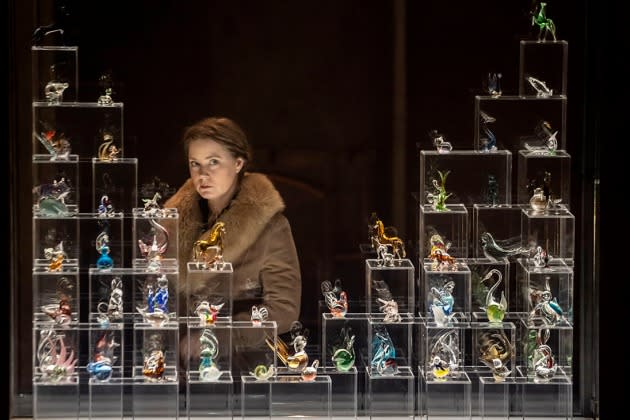Amy Adams in ‘The Glass Menagerie’: Theater Review
- Oops!Something went wrong.Please try again later.
- Oops!Something went wrong.Please try again later.

Amy Adams makes a rare stage appearance, and her first in London, as Amanda Wingfield, the domineering, showboating, delusional matriarch of Tennessee Williams’ semi-autobiographical memory play, The Glass Menagerie. It might seem that the character was tailor-made for the formidable, multiple Oscar-nominated Adams, who is so often adept in the fertile zone between folly, frailty and darkness. And yet, while offering a perfectly charming performance in Jeremy Herrin’s West End revival, she surprisingly fails to find any edge to it.
Whether this is a symptom or the cause of a slightly underwhelming production is difficult to judge; by all accounts the play is a delicate thing that often eludes the best of them. On the plus side, the low wattage of the tentpole star turns the evening into a more pronounced ensemble affair that is always gently engaging, and through which one actor does wring a briefly shattering degree of pathos.
More from The Hollywood Reporter
Why the PBS Doc 'Keeping Company With Sondheim' Is a "Detective Story" Instead of a "Museum Piece"
Video Saved the Theater Star: How a Digital Capture Boom Is Bolstering Pandemic-Era Broadway
With the world currently teetering on the edge of recession, there’s more than the usual worrisome ring to Williams’ Depression-era tale of a fatherless family barely scraping through, and a son torturing himself with work he loathes as the sole breadwinner. Vicki Mortimer’s design of their St. Louis apartment, almost no set at all, captures the penury: a bare table centre stage, clutter around the far edges (a few chairs, a record player, an old piano), the only color in the form of a glass display case containing the shiny animals that represent the hobby and single source of pleasure for a lonely young woman.
This is the setting for a domestic drama that focuses on former Southern belle Amanda’s determination to see her reclusive, painfully shy daughter Laura (Lizzie Annis) married and with some kind of future secured, while her son Tom works in a warehouse and dreams of being a writer, simmering angrily with an eye on escape.
The depth of the play comes less from the scenario than the telling of it, through the memory, or invention — “truth in the pleasant disguise of illusion” — of the older Tom. Director Herrin, who staged a fine production of All My Sons at the Old Vic in 2019 featuring a fabulously volatile performance from another Hollywood royal, Sally Field, tackles this element with a seemingly obvious but seldom used device: having two actors play Tom. Paul Hilton (The Inheritance) is the older, unreliable narrator, Tom Glynn-Carney (The Ferryman) the young firebrand.
It’s pretty effective, offering a palpable image of what Tom has become: a rakish, worse-for-wear chap with a lifetime of regret for abandoning his family etched into his features; though he never relinquishes the writer’s eloquent turn of phrase, is that alcohol wetting the edges of his delivery? This Tom skulks around the edges of his own story, observing, even spying on the action rather than simply relating it, sometimes even offering props to the other characters — the telephone, a mirror. When the younger Tom promises his mother that he will never drink, the older version sinks down and puts his head in his hands.
Glynn-Carney absolutely convinces as a young man “boiling inside,” bringing much needed energy to proceedings, with a hyena laugh that gives a clue as to how the character may fall off the rails. Tom’s angry scenes with his mother, frustration met with studied forbearance, have a ring of truth about them.
But while Adams has a likable, jostling rapport with Glynn-Carney, and milks the humor out of Amanda’s affectations, especially when dressing up to relive her supposed glory days receiving record numbers of “gentleman callers,” she doesn’t conjure the passive-aggression that is surely part of the character’s toolbox, or the undoubted pain of her husband’s desertion years before, which is so often referred to. And the Southern belle aspect is so dialed down as to be almost non-existent. This feels like a watered-down version of what the character might be.
As the novelty of the dual Tom wears away, the production needs to find its power elsewhere. Despite an appealing performance by Victor Alli as Jim, who assays a difficult line between kindness and pomposity as a possible suitor to Tom’s sister, Herrin’s decision to play their lengthy tete-a tete by candlelight threatens to extinguish the drama entirely. But it’s saved, and then some, by Annis.
Making her professional debut, Annis has already lent Laura an affecting vulnerability, mixed with the kind of stubbornness that is born of a life alone, making one’s own entertainment. Now, with Jim’s clumsy cruelty, her heart broken, she stands perversely transfixed, a painful smile etched on her face as her mother blathers on about her own disappointment. It’s positively heartbreaking.
A special mention for Ash Woodward’s video design, which occupies the back wall of the stage with distorted and distended silhouettes, sepia photographs and full-on abstractions, to add to the sense of a tale told through memory and regret.
Venue: Duke of York’s Theater , London
Cast: Amy Adams, Paul Hilton, Tom Glynn-Carney, Lizzie Annis, Victor Alli
Playwright: Tennessee Williams
Director: Jeremy Herrin
Set designer: Vicki Mortimer
Costume designer: Edward K. Gibbon
Lighting designer: Paule Constable
Video designer: Ash J Woodward
Music and sound designer: Nik Powell
Presented by Second Half Productions

